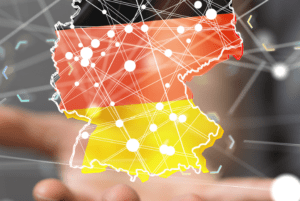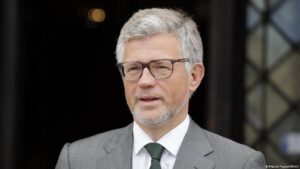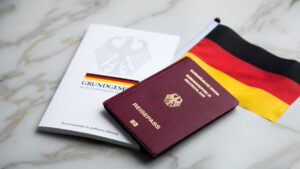
The volume of the German economy in the second quarter did not change compared to the previous three months, according to preliminary data from the German Federal Statistical Agency (Destatis).
In annual terms, GDP growth, adjusted for the number of working days, was 1.4%.
Analysts on average expected the first indicator to rise by 0.1% and the second by 1.7%, according to Trading Economics.
In the first quarter, GDP grew by 0.2% qoq and increased by 3.8% yoy.
The volume of the German economy is still 0.2% lower than in the fourth quarter of 2019 – that is, in the last quarter before the onset of the coronavirus pandemic, Destatis said.
Destatis will publish final data on the dynamics of the country’s economy in the second quarter on August 25.
At the same time, the statement of the statistical office notes that due to the ongoing COVID-19 crisis and the Russian invasion of Ukraine, the data is subject to more uncertainty than usual. This indicates the possibility of a stronger revision of the figures compared to those originally announced.

Germany will supply Ukraine with 16 Biber bridge-laying tanks, the German Ministry of Defense has reported.
“We continue to support! To further support the ground forces of Ukraine, Minister Lambrecht has decided to deliver a batch of 16 Biber armored bridge layers. They can be used to overcome water or other obstacles in battle,” the ministry said on Twitter on Friday.

Prime Minister of Ukraine Denys Shmihal says that the Ukrainian authorities expect to hold an international expert conference in Germany on the restoration of Ukraine in autumn.
“We appreciate Germany’s contribution to ensuring the unity of the European Union in support of Ukraine and measures to counter full-scale Russian aggression. I also want to thank the German side for the fact that, following the results of the G7 summit, German Chancellor Olaf Scholz announced the convening of an international expert conference on the restoration of Ukraine and the creation of an appropriate recovery plan within the framework of the German G7 presidency,” the government press service quotes Shmyhal after a meeting with German Federal Minister of the Interior Nancy Feser and German Federal Minister of Labor and Social Affairs Hubertus Geil.
The prime minister stressed that Ukraine expects such a conference to be held this autumn in Germany, and according to him, the European Commission also expressed its readiness to join the event.
In addition, Shmigal thanked Germany for providing Ukraine with 1 billion euros in grant financial assistance.
The parties also discussed the development of projects in the social sphere, as well as the issue of recognition of Ukrainian documents in the Diya application.
In turn, German Federal Minister of the Interior Nancy Feser said that Germany is ready to help in clearing Ukrainian territories and will do everything in its power to help Ukraine in the war.

President of Ukraine Volodymyr Zelensky has dismissed Andriy Melnyk from the post of Ukraine’s ambassador to Germany.
The corresponding decree was signed on July 9 and posted on the website of the head of state.
Melnyk has served as Ukraine’s ambassador to Germany since 2014.

Tens of thousands of migrants will be able to legally stay in Germany after the country passed a law that makes it easier for them to obtain documents for permanent residence, the Associated Press (AP) reported on Wednesday.
“We want people who have already settled here to have good opportunities,” German Interior Minister Nancy Feather was quoted as saying by the AP.
“Also through this law, we will put an end to bureaucracy and uncertainty for people who have become part of society,” she added.
The new measure will affect around 136,000 people who have lived in Germany for at least five years.
At the same time, these people must have a decent salary, speak German and prove that they have integrated well into society.
Those who meet the necessary requirements can first apply for a residence status in Germany for a period of one year, and then for a permanent residence permit in the country.
People under 27 can apply for permanent residence after they have lived in the country for at least three years.
Information technology specialists, as well as some other specialists that Germany needs, will have the opportunity to move with their families, which was not possible before. In addition, the law will make it easier to enroll in German language courses for refugees, as well as facilitate the deportation of criminals.

Germany is ready to hold a conference on reforms in Ukraine in 2024, German Minister for Economic Cooperation and Development Svenja Schulze said.
“The restoration of a free and democratic Ukraine is our joint goal. Recovery and reforms are elements of what will be a strategic task for the coming years. Therefore, Germany will also host an international expert conference on reconstruction issues. Germany is also ready to host a conference on reforms in Ukraine in 2024 “, she said at the International Conference on the Reconstruction of Ukraine in Lugano (Switzerland) on Tuesday.
Schulze emphasized that the platform for the restoration of Ukraine should unite the Ukrainian government, all international partners and experts.
In addition, the minister stated that her government is committed to providing grants in the amount of EUR426 million in direct support to Ukraine.